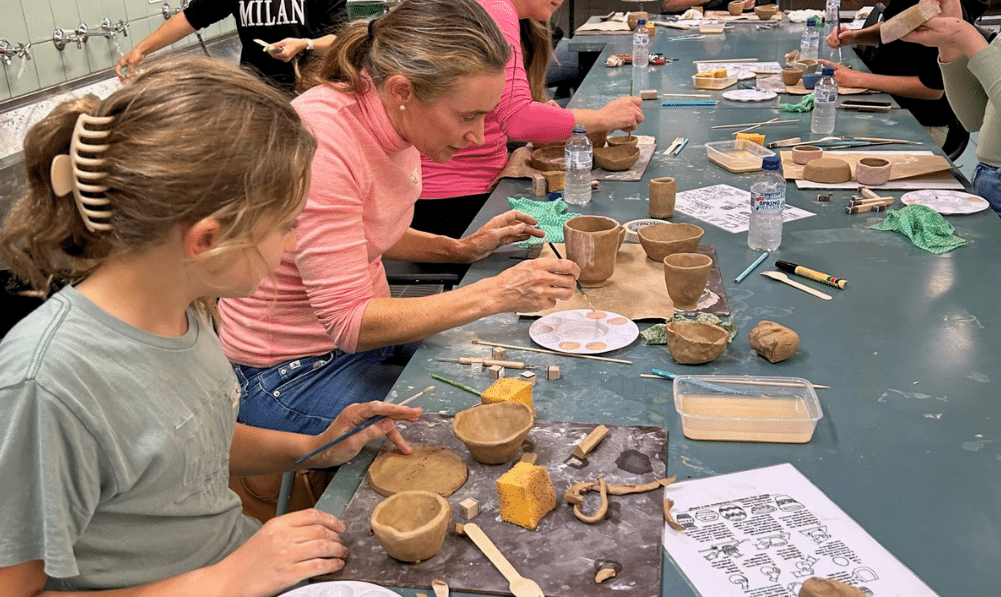Never Underestimate The Impact of Family – Jennifer Oaten

As Principal, I hear of parents facilitating party bus birthday parties, sleepovers at Crown or buying our students the latest iPhone, but is this really what our young people need to flourish? It is not material goods or events that our young people need to grow, but strong family connections and support.
Our families are one of the most important parts of our lives. Human beings are social creatures, and families provide not just basic needs for young people but also emotional needs. We are wired to connect with others and to thrive when we have strong relationships. Researchers have observed that in all societies, family plays a crucial role in the wellbeing and success of individuals.
Families come in different shapes and sizes, including biological, blended, single-parent, adoptive, same-gender, and extended families. Regardless of the family structure, what is crucial is the presence of caring, supportive individuals who can fulfil the role of a family in a teenager’s life
Why are strong family connections so important to us as a school?
Many of the mental health issues we are seeing in schools have connections with challenging family situations. Fractured families, angst between family members, and physical and verbal aggression, are more common and more accepted in society, but this has serious repercussions for our young people when they are most vulnerable. I believe families have a critical role to play in the mental health of young people.

The top 6 things young people need from their family to thrive
1. Love – The universal desire for love is particularly strong among young people. Compassion, kindness, and actively showing love not only contributes to the development of their self-esteem and confidence but also instils in them a profound sense of being valued for who they are. Love creates a powerful sense of belonging.
2. Time – The significance of spending quality time with our daughters cannot be overstated. It is an invaluable investment in their mental, emotional, and physical wellbeing. These shared experiences allow us to foster deep connections and build trust, providing a solid foundation for their growth. As your daughter grows and changes, so should your relationship. Be willing to adapt your approach and find new ways to connect with her as she matures.
3. Role Models – Positive adult role models have the potential to inspire teenagers to adopt positive attitudes, develop a strong work ethic, and believe in themselves. Family relationships that model respect and healthy interactions with spouses, friends, and extended family encourage teenagers to respect both themselves and others. Family values also shape the values individuals carry throughout their lives. Prioritising your own mental, emotional, and physical wellbeing and how you manage life’s challenges provides valuable learning for your daughter.
4. A Safe Haven – Providing a safe and accepting environment is crucial, especially in a world filled with challenges. It offers a sense of security and the knowledge that home will always be a place of refuge. No matter the ups and downs of friendships, the unconditional support and forgiveness provided at home are invaluable. Sharing and understanding emotions and how they evolve lay the foundation for greater emotional regulation and resilience.
5. Boundaries – Rules are bound to be challenged, but having structure, boundaries, and clear expectations plays a vital role in promoting responsible choices and guiding actions. They are essential for ensuring the safety and mental wellbeing of young people, especially when it comes to navigating risky behaviours, technology and adequate sleep. Consequences also help teach responsibility for your actions when mistakes are made.
6. Academic Support – All young people are unique, so it is important to provide a supportive environment for their diverse academic pursuits. Motivating teenagers to pursue their best can be achieved by offering assistance with homework, engaging in discussions that stimulate their intellectual curiosity, and exploring future pathways. This approach helps identify their strengths and can empower them to achieve future success.
None of these cost money! They are all free and can have so much influence, particularly on the wellbeing of young people. Never underestimate the impact of your family.

A strong parent-child relationship provides a foundation for a healthy, thriving connection with your daughter. Research has shown that children who have close relationships with their parents are less likely to experience depression and anxiety, perform better academically, and develop self-esteem and social skills.
7 Ways to help strengthen family connections
1. Engage in Shared Activities: Find activities that both you and your daughter enjoy. This could be cooking, going for a hike, painting or board games. Shared activities provide opportunities for bonding and creating lasting memories.
2. Schedule Regular Family Time: Set aside dedicated time each week for family activities. This could be a weekly movie night, a game night or a family dinner. Consistency is key, and having a regular schedule makes it easier to prioritise family time.
3. Be Present and Attentive: When you are spending time with your daughter, be fully present and engaged. Put away distractions like phones or work-related stress and focus on enjoying the time together in conversation.
4. Encourage Open Communication: Create an environment where your daughter feels comfortable sharing her thoughts, feelings, and concerns with you. This might involve setting aside time each day for open conversations.
5. Support Her Interests and Passions: Show interest in your daughter’s hobbies, activities, and aspirations. Attend her games or performances, ask questions about her interests, and encourage her to pursue her passions.
6. Create Family Traditions: Establishing family traditions can create a sense of belonging and promote bonding. This could be an annual camping trip, celebrating special occasions, or simply having a special meal together as a family.
7. Have a Kindness Tree: Encourage daily acts of kindness in your family. See first-hand the incredible impact our Kindness Challenge can have on your family’s dynamics. You will be amazed by the meaningful conversations and connections that are fostered within your family. Not only will it bring everyone closer together, but it will also promote an atmosphere of love, support, and understanding. You can purchase one of our Kindness Challenge Kits HERE to help you get started.

Parents who are not together can still provide the above. Consistency is key, as is respect for each other. When parents separate, children may struggle with feelings of insecurity, anxiety, and sadness. It is essential to prioritise your child’s needs and maintain open communication about important decisions. Even if emotions are running high, putting your daughter’s needs first and working together to ensure her wellbeing is crucial.
As the renowned author and family therapist Virginia Satir once said, “Feelings of worth can flourish only in an atmosphere where individual differences are appreciated, mistakes are tolerated, communication is open, and rules are flexible – the kind of atmosphere that is found in a nurturing family.”
Despite the occasional embarrassment that our families may cause, they serve as our steadfast support system. By dedicating time, love, and energy towards cultivating robust family bonds, you can provide your daughter with invaluable benefits that extend far beyond the present moment. Among these advantages, perhaps the most significant is the promotion of her mental wellbeing and happiness, which will continue to flourish throughout her life.

Exploring the Artistic Universe of Isabelle de Kleine (2011)
From childhood, Isabelle de Kleine’s talent flourished, guided by the supportive Art department into the renowned artist she is today.

What A Term! So Many Opportunities – Jennifer Oaten
As I look back on the past nine weeks, I am so grateful for who we are as a community and what we have achieved. Through the dedication of our staff and the enthusiasm of our students, we have established new connections, immersed ourselves in opportunities and worked through challenges.

From the President: April 2024
President Gemma Varone, welcomes you to the April edition of the OGA Blog.
- Featured
Author: Santa Maria College
Santa Maria College is a vibrant girls school with a growing local presence and reputation. Our Mission is to educate young Mercy women who act with courage and compassion to enrich our world. Santa Maria College is located in Attadale in Western Australia, 16 km from the Perth CBD. We offer a Catholic education for girls in Years 5 – 12 and have 1300 students, including 152 boarders.







